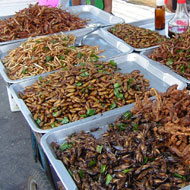Gut health could benefit from consuming crickets - study

Deep-fried insects at a stall in Bangkok, Thailand. Image © Takoradee (CC BY-SA 3.0)
Eating crickets could benefit human gut health and reduce inflammation in the body, according to a new study.
Over two billion people worldwide regularly consume insects, but there has been little research on the health effects.
In a small pilot study, researchers took blood and stool samples from 20 healthy men and women, after they had eaten either a control breakfast or one containing 25g of cricket meal for periods of two weeks.
Findings published in the journal Scientific Reports suggest that, after eating the cricket diet, participants had increased levels of a metabolic enzyme associated with gut health. Meanwhile, there was a decrease in TNF-alpha, an inflammatory protein in the blood that has been linked with other measures of wellbeing such as depression and cancer.
There was also an abundance in beneficial gut bacteria such as Bifidobacterium animalis - a strain that is associated with improved gastrointestinal function and other health measures.
Researchers say further, larger studies are needed to replicate these findings and shed more light on how crickets may contribute to gut health.
Lead author Valerie Stull commented: “This study is important because insects represent a novel component in Western diets and their health effects in human populations haven’t really been studied.
“With what we now know about the gut microbiota and its relationship to human health, it’s important to establish how a novel food might affect gut microbial populations. We found that cricket consumption may actually offer benefits beyond nutrition.”
She added: “This very small study shows that this is something worth looking at in the future when promoting insects as a sustainable food source.”



 The Veterinary Medicines Directorate (VMD) is inviting applications from veterinary students to attend a one-week extramural studies (EMS) placement in July 2026.
The Veterinary Medicines Directorate (VMD) is inviting applications from veterinary students to attend a one-week extramural studies (EMS) placement in July 2026.